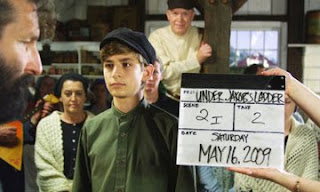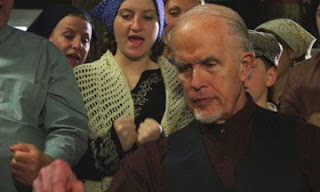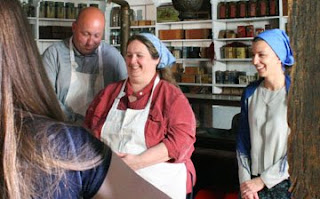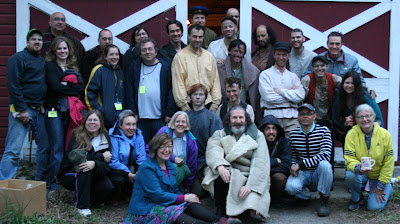I promised the Twitterverse this list a few weeks back. Life gets in the way of completing things though. I eventually hope to have more than a draft for you, but I also hope it won't be necessary. I initially thought this was just a top ten list, and maybe it should have been. I already know I have left important things off this list though, and here I am at eighteen.
Having already left home before I hit such a mark, it seems fit this list does likewise. The comfort of the nest is part of the problem and its time to get the conversation started. And like so many things, with this list it is not about the size, but about the intensity with which we engage with each element. I wish I could give marching orders instead of discussion points. I wrote this to encourage but you can use it as a litmus test for whether you really want an independent and diverse culture or not. What are these are you doing? What of these are you willing to do?
The time is now. If we don't fully own the absolute necessity to change how we've all been working, we won't be working -- and we won't have the illuminating, inspiring, transforming films that we now enjoy. It's your choice, but action is required.
There is the capacity for many more of us to create and prosper from creative media work. This capacity can also close up and vanish along with our audiences. The canaries are now the size of Big Birds and we somehow are able to ignore them (but that is a subject for a different posts).
SO YOU SAY YOU WANT A SUSTAINABLE & TRULY FREE FILM COMMUNITY AND CULTURE? Time to take some action.
Mentor - if you have been working in the film industry for at least five years, you certainly have the knowledge to help lift somebody else up. Ideally this would be someone from a much different background than yourself (more on that later) so things don't have to stay the same. That said, those that you lift up will also carry on some of your knowledge, so the bonds that need to be strengthened hopefully will be.
Curate- You got into this business because you loved film, maybe you even always loved talking about films, but what do you do now to help spread the love? Friends and family are the best influencers in terms of getting others to see films, and there won't be any business unless we keep people going to the movies. Whether its as simple as getting friends over on the weekend to watch something they wouldn't normally have, using a social network tool to get a large group out and into the theaters, blogging about the things you think are essential, or forming a film club and actually booking films you love, there's something you could be doing to get work you love seen and appreciated. There are over 6000 films made a year; it's overwhelming. You have to become the filter for your friends, family, and followers. Tell them what you love, share it. And there are many alternatives that sending around that link where you found that others labors are now being bootlegged.
Provide- info, advice, access - Industries all go through cycles and it may have once benefited some folks who got established early to limit what others could know or get to do, but those days ended. It is changing too fast and yesterday's discovery is old news pretty damn fast. Our future depends on innovation and unity; sharing what you know and have are the most likely ways for each to occur. If you learn something, pass it on. Post it. Tweet it. Discuss it.
Learn/Evolve- Everyone likes to quote William Goldman's line about the movie industry, but it has never been truer that no one knows anything now. The ways films were financed & sold for the last fifteen years are no longer do-able. Audiences don't consume the way they used to. There is no acquisition market and no business model has emerged for earning significant revenue on the internet. People have been convinced that hardware should be expensive whereas content should be free (i.e. creators have become the advertisers for the manufacturers). We have the tools to build a new model but our ability to use them is rather limited. It's time to try new things and if you aren't learning new things on a regular basis you might as well admit defeat now. Build experimentation into your daily regime, into your business plan.
Migrate - Although this is close to "Learn/Evolve", migration is a specific form thereof. As much as we need to strengthen the net, we have to extend our web's reach. We have to both give and take. Cinema requires a global awareness and participation. Specificity is universal. You aren't just making your work for friends and family, unless it is the Family Of Man (to borrow an inaccurate phrase). Travel and source. Bring it back home. Give it away. Extend your reach and modify your inputs, but cross borders. It is a global community and the more we embrace that, the stronger we will be.
Aim Higher With Content Quality -For years the movie business flourished because not enough material was available. Now everything is there for the viewing when you want it, where you want it, and how you want it. As a filmmaker today you are competing against everything that came before you. Yet also as a filmmaker you have the benefit of having access to all of film history that has preceded you. You get to see what others have done, but you have to take it one step further. Since you can no longer win by getting there first, you have no choice but to try to do it better.
Aim Higher With Narrative Structure & Ambitions - It's not enough to have a good story well told anymore. Cinema is over one hundred years old and stories can't just have a beginning, a middle, or an end. Our films won't survive if they are dependent on a single author to deliver them or don't inspire others to deliver them. Take back what has always been yours and embrace the other aspects of filmmaking beyond content and production. There are many points of access to a story and many reasons to return to the world, but we have not been utilizing them.
Introduce- We have to knit this net a whole lot stronger. If your friends are stronger, you are stronger. One persons success does not limit yours, but quite the opposite -- it enhances your position. You have to work to get your team further down the field. It takes more than an army to create, promote, market, distribute, and appreciate good work. If you are not providing introductions to those that you know who will benefit by knowing the other ones you know, you asking to play a game solo when everyone else will be be fielding battalions.
Make Different, Make Strange & Change- Does it ever feel to you that half the films that get made are remakes but they don't know it? Or that everyone is preaching to the converted but they forgot what the sermon was about? Or maybe that they long ago stopped looking for the real sky and were content to keep going as long as the treadmill was moving? Once I had a friend come to me with so much urgency asking "Don't they get it? Our job is to make them want to be over there, farther away from here, aspiring for something better, feeling the hope that they can get there." He was right, but we aren't going to do it by repeating what has been done before.
Ignore - There are many in the film business who are never going to help you. Many of these will never help you even after you have helped them. The sooner you identify these folks and stop wasting your time with them, the better off you are going to be. We have to much to do to bother with them, no matter how powerful they may be, how smart or creative they may be, or how much they appear to have to offer you. Get on with it and move on.
Reduce- Unfortunately the industry has been rewarding quantity more than quality. Even more unfortunately, bad work has a greater impact than good, and its impact is not of the positive sort. Very little can prosper in an environment of poor attention, limited commitment, or fractured focus. I don't know anyone who doesn't have too much to do already (and less money or time to do it in than previously). We could all gain by slowing down and doing less but doing that thing we do better. We have to. The independent sector doesn't have the money to fool people to think that their mediocre work should be seen. More work needs to go into both making our films better and into how to reach and engage with our audiences in more rewarding way. Unless a filmmaker can demonstrate both of those qualities, they shouldn't be shooting their film. Failure in either department brings all of us down with it. We are all connected and only the best work lifts us (don't get me wrong, we can't have gate keepers determining what or who "is ready" to make a film -- we just have to be more demanding on ourselves).
Participate - You have something to say, so say it. Others are saying the things you believe, so let it be known. Your skill set and experience are both unique to you, but others would benefit from the gift of your engagement, so why not get something done now, even if it is not what you ultimately are striving for. We don't have time to be silent. Speak up not just about what you know or feel, but what you want to know or feel. If you care about something, write in, or send a proxy. Encourage others to do the same too. The world will change for the worse unless you engage.
Collaborate - We learn more when we break our normal routine and do something different, be it a different task, or a different situation, or a different sort of creation. There are times to lead and times to follow. We learn from those that see differently than us. We understand and process things better when it involves others we care about. There is also no denying that there is so much change both needed and occurring that we can't possibly gain by working alone. If you haven't realized that you can't possibly get it done alone anymore, you haven't engaged. Filmmaking and it's secondary necessities of marketing and distribution can't be the work of a singular auteur anymore -- cinema requires that you (to borrow IndieGoGo's mantra) Do It With Others.
Go To The Crowd - We need our work to have greater reach. At some point in the process, we need to engage and encourage everyone out there to determine something about the work. This makes them stakeholders in the process and cements a deeper relationship with you. Both CrowdSourcing and CrowdFunding are marvelous endeavors, not just for what the immediate product they bring, but for the engagement they deliver. Don't get me wrong, there are inefficiencies in many approaches and in reaching out we need to offer meaningful ways for people to engage, and reasons for them to remain. Today's collaboration is not just about working with those you know, but also those that you don't and won't ever know.
Question- I find the obvious is often ignored by the status quo. Whether it was making movies for six figures, creating a producer-driven company, starting an international sales company & licensing our own films, cutting digitally, shooting video and transferring to film, or the actions I currently contemplate, I have found resistance from the mainstream to adopt new behavior that might be game-changing. Culturally, we've all been seduced by security and knowledge, but it is risk and exploration of the unknown that usually moves us forward.
Keep It Human & Personable- It is sooo hard to get a movie made. It is soooo hard to write a decent script. It is soooo hard to find a way to make a living and to be engaged in the creative arts. Anyone that does any of these things is a hero to me. Good fortune is rare, but it is needed for most to obtain the life they want. It may take something that resembles an army to make a movie, promote it, and get it seen, but those engaged in the process are usually operating out of some aspect of love, and need acknowledgement. What's with all the ego that swims through this business?
Reward- If you are trying to make movies, or already working in the film business, you have too much on your plate; if you are able to do good work, help those around you, or just make stuff happen, you are probably super human. If someone around you is doing this kind of stuff, show your appreciation. When I get a note from someone that they liked my film, it makes my day. When someone has tried to help me without any personal gain on their part, I think the world may actually be an alright place. When someone indicates that they know what I do and they treat it with all due respect, I think we might just get out of this situation somewhat intact. Vote for the world you want with your actions and appreciation.
Make It All One Ongoing Conversation - We squander our efforts when we think only about the single project at hand. It is not about just getting that one movie done. We have to keep moving the conversation forward. We have to engage with our community in such a meaningful way that they will be motivated to move with us to the next project too. Don't reinvent the wheel each time, but if you have invested the time to seed an audience, feed them and breed them; bring them with you to all that you are doing. Help them understand why X eventually follows A. Keep them engaged. Keep them loyal.
And you thought you didn't have enough to do today!










